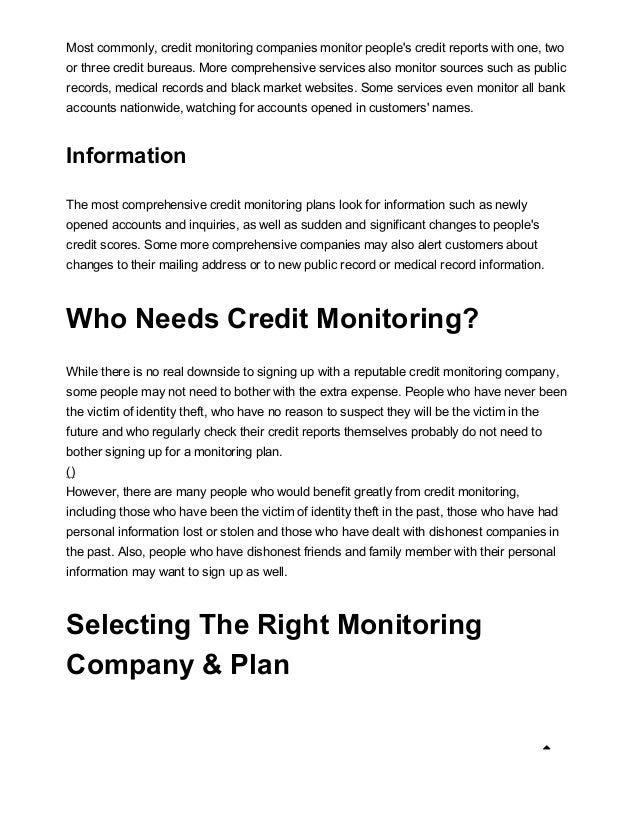Is Credit Report Monitoring Worth It,
By
Easy Tips
—
Sunday, 15 July 2018
—
Credit Tips

For those involved in a credit repair program, the access to their reports and credit scores is vital. More than likely they're trying to secure a car loan or a mortgage, so tracking their scores will give them a clear indication of when they've hit their specific goal. For those that are repairing their own credit, getting all of their credit reports is going to be the starting point. The items listed on their reports determine their scores and dictate exactly what needs to be done in order to maximize their credit profile.
Credit alerts are valuable because they notify you of any changes to your credit reports. During the credit repair process this will allow you to see what accounts have been corrected, removed or verified by creditors and collection agencies. While those who are worried about identity theft will get updates via e-mail, text messages to their phone or standard mail about changes to their profiles immediately.
This can help catch identity theft before the problem escalates. If your identity is stolen, and you're not constantly monitoring your credit reports, the thieves will continue to use your identity to rack up considerable amounts of debt. Over 85% of people who discover that their identity was stolen find out while applying for a credit card or loan.
Being able to catch it before that happens will save you a lot of time, money and aggravation. Be aware that the majority of the ID theft prevention tactics used by companies that specialize in this arena are usually available for free if you're willing to do the legwork yourself.
Fraud alerts can be placed on your credit reports with all three of the major credit bureaus. They force credit grantors and lenders to verify your identity before extending you credit or a loan. Adding yourself to the Do Not Call list and opting out of pre-screened credit card offers keeps your information out of the hands of people and companies that you may not want to have your identity. While these are largely legitimate businesses that end up checking your credit info, it's still safer to choose who you want to pull your credit reports.
This might be the greatest value with credit report monitoring services. Think of your monitoring fees as insurance you pay monthly in the event that something goes wrong. The time and money spent to fix problems caused by ID theft can be overwhelming. The average amount of time to completely resolve your credit profile after ID theft is generally considered to take hundreds of hours. According to Javelin Strategy and Research, identity fraud continues to rise in America.
In 2009 it claimed 11.1 million victims, up 12% from 9.9 million in 2008. The study found that consumers who monitor their accounts electronically generally spend at least 50% less during the clean-up process. As discussed earlier, you should probably view monitoring your credit reports as ID theft insurance. While identity theft is only happening to just under 5% of the population, it is a growing crime. Whether you hire a financial institution to handle it for you, or go it alone, be sure to take the necessary steps to avoid your information from ending up in the wrong hands.
If you're actively repairing your credit, then credit monitoring is the only way to track if you're truly making progress. If you decide that after the credit repair process is finished that you no longer want to monitor your scores, make sure to pull your free credit reports at least once a year. It never hurts to check to make sure that your credit profile is 100% accurate.
6 - Script Adherence - Speech analytics also helps in monitoring how well customer services agents follow their scripts, communicate required information, or utter inappropriate phrases or words. To Conclude “Speech Analytics Solutions” is the future of Marketing Intelligence that helps in gathering information through market research, providing quantifiable data in order to fetch reports efficiently. There are various benefits of speech analytics technology which has also been deployed by many other departments, including marketing, sales, operations, product development, credit, and collections, for customer insights analysis.
Most identity monitoring services offer credit monitoring with one credit bureau or all three credit bureaus: Equifax, Experian and TransUnion. Credit monitoring alerts you to changes in your credit file, such as credit inquires, delinquencies, judgments and liens, bankruptcies, new loans and more. As we learned in a previous post, being denied for credit is a common sign of identity theft.
While there is no surefire way to prevent all instances of identity theft, credit monitoring is one way to become aware of suspicious activity before you sustain significant losses. If you’re like most people, checking your credit report is only something you do once a year. A credit monitoring service can provide ongoing monitoring of your credit information and alert you to possible fraudulent identity-related activity.
While not all alerts are cause for alarm, being aware of the activity on your accounts can allow you to dispute fraudulent charges before any serious damage is done, and allow you to begin the resolution process sooner. How Can My Credit Information Help Me Spot Identity Theft, Your credit information is the first place to look when you suspect identity theft has taken place. Mistakes on your credit report. Delinquent accounts you don’t recognize.